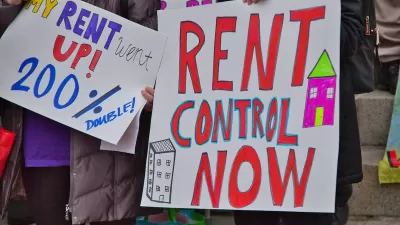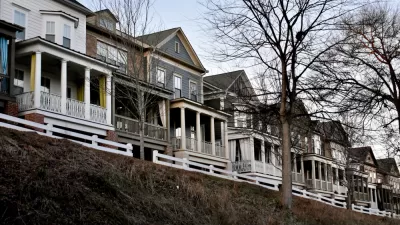Atlanta's inclusionary housing program, which closely reflects the proposed Denver plan, could serve as a bellwether for Denver's own future.

According to an article by Joe Rubino in The Denver Post, "As Denver’s version of inclusionary zoning inches forward (and some development industry groups cringe) the city of Atlanta and its program stand out as a comparable example of the concept in action."
Rubino points out that Georgia, like Colorado, prohibits rent control at the state level. This leaves cities like Atlanta and Denver with limited options for increasing affordable housing, which primarily include incentives for developers. "Unlike Denver, Atlanta’s program is focused largely on new apartment projects of 10 or more units in targeted parts of the city. It was recently expanded to cover for-sale housing in one neighborhood. In Denver, the policy would apply to any new development of 10 or more rental or for-sale units anywhere within city borders."
As Rubino writes, Atlanta's program created hundreds of affordable units in its three years of operation, and was not shown to decrease the rate of construction, a common fear. Rubino quotes Joshua Humphries, Atlanta’s director of housing and community development: "Multi-family (development) has continued at a comparable pace to the three years before inclusionary zoning and comparable to the rest of the city."
The article describes Atlanta's program in more detail and the response from the Atlanta Apartment Association, which disputed the city's claim that development wasn't slowed by the policy and added that many projects moved forward thanks to additional subsidies or funding sources.
Denver could finalize its inclusionary housing policy by late June.
FULL STORY: Denver’s controversial affordable housing plan mirrors Atlanta’s. Here’s what we can learn.

Trump Administration Could Effectively End Housing Voucher Program
Federal officials are eyeing major cuts to the Section 8 program that helps millions of low-income households pay rent.

Planetizen Federal Action Tracker
A weekly monitor of how Trump’s orders and actions are impacting planners and planning in America.

Ken Jennings Launches Transit Web Series
The Jeopardy champ wants you to ride public transit.

California Invests Additional $5M in Electric School Buses
The state wants to electrify all of its school bus fleets by 2035.

Austin Launches $2M Homelessness Prevention Fund
A new grant program from the city’s Homeless Strategy Office will fund rental assistance and supportive services.

Alabama School Forestry Initiative Brings Trees to Schoolyards
Trees can improve physical and mental health for students and commnity members.
Urban Design for Planners 1: Software Tools
This six-course series explores essential urban design concepts using open source software and equips planners with the tools they need to participate fully in the urban design process.
Planning for Universal Design
Learn the tools for implementing Universal Design in planning regulations.
Ada County Highway District
Clanton & Associates, Inc.
Jessamine County Fiscal Court
Institute for Housing and Urban Development Studies (IHS)
City of Grandview
Harvard GSD Executive Education
Toledo-Lucas County Plan Commissions
Salt Lake City
NYU Wagner Graduate School of Public Service





























